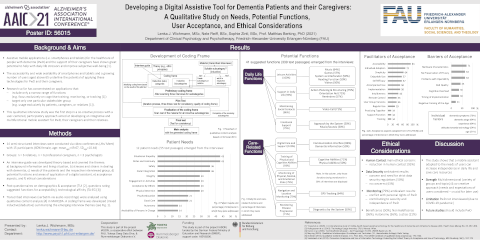Also from our partner in the joint project IASON, the Institute of Clinical Psychology (KliPs) at the Friedrich-Alexander-University Erlangen-Nuremberg (FAU), a poster was presented under the title "Developing a Digital Assistive Tool for Dementia Patients and their Caregivers - A Qualitative Study on Needs, Potential Functions, Practical Requirements, User Acceptance, and Ethical Considerations") as part of the IASON collaborative project at AAIC21.
This is the planned preliminary study on user acceptance of a smart digital assistant by dementia patients and their caregivers. This preliminary study was conducted using telephone interviews with caregivers due to corona-related limitations.
Preliminary results showed that dealing with symptoms of dementia in everyday life was burdening. Emotional needs in patients and needs for additional care resources in relatives and caregivers were the most important unanswered needs. 53 functions were suggested in the areas: digital care, support, training, monitoring, navigation, leisure activities, and social contacts. Participants had ethical requirements (i.e. data protection, privacy, and autonomy) that if met, would enhance acceptance. Results on questionnaires showed positive attitudes towards, curiosity about, and no insecurity with regards to technology. The overall acceptability of suggested functions was high.
Files:



 English
English  Deutsch
Deutsch